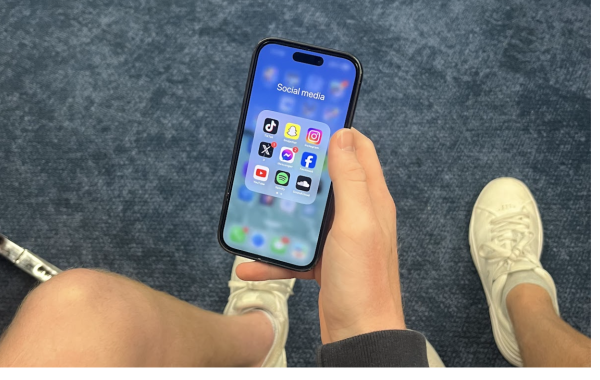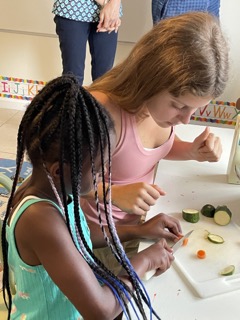Words Hurt: Be Careful How You Speak
It’s easy to be ignorant about how you speak. After all, something that can seemingly be harmless can come off in the wrong way, whether it be hurtful or makes you seem arrogant when that was never the intention. Be careful how you speak; words are powerful.
“People become so preoccupied with figuring out the ‘right’ things to say that they forget to actually listen to the people around them,” an article titled The Pressure To Always Say the ‘Right’ Thing Affects the Way We Communicate on The Swaddle said. This difficulty persists in the daily life of others and leads people to wonder what’s the best way to speak.
In English classes here at Benjamin, diction is always a topic that appears. While it is analyzed in a literary sense, it is a concept that also applies to everyday interactions. Diction, an author’s word choice, is important to get a sense of what an author is trying to communicate and why. Everything is said for a reason, and analyzing their diction is an important part of that.
You don’t approach somebody saying, “Give me $2.” You say, “can you please give me $2?” Saying the former not only decreases your chances of getting the money, but it also could hurt your character. You are seen as rude and perhaps ignorant. A positive outcome is much more likely in the latter way of phrasing the question because of your politeness.
You should approach situations calmly and explain the situation with a sense of ease. Don’t get worked up and angry because that could result in a worse situation.
Additionally, here at Benjamin, many of us have more opportunities and are more privileged. Read the room. If you’re in a place where you seem like you are more privileged than everybody, maybe it’s not best to blurt out that you went to Italy for two weeks and went to Venice, Florence, and Rome. Be mindful of where you are and who is around you. People could feel lesser and shame themselves for not having the capacity to go on a trip like that — even when it is no way their fault.
Be positive. If somebody is being negative about something, try to uplift them. Rather than feeding into their pessimistic words, tell them about how it’s going to get better. Of course, be sympathetic and understand what they’re going through, but try not to let them sulk. Body positivity is a discussion that has increasingly become relevant over these past few years. If somebody is feeling down about something in relation to that, try to uplift them. It can go a long way.
In a YouTube video by Doctor Mike titled “Things Bad Doctors Say” (https://www.youtube.com/watch?v=Y0PWqL6HvaY), he covers the wrong ways doctors can communicate to their patients. At one point, the doctor says, “do you think that’s good for your overweight, morbidly obese body?” This is absolutely the wrong way to approach this, as Doctor Mike explains. The doctor needs to be mindful of the situation and understand that these words can hurt. Further, he needs to explain the situation better. Why is it bad and what can be done to improve the situation?
Part of speaking appropriately is sometimes not speaking at all. There are situations where simply keeping your mouth shut is better than opening it. Be mindful of the conversation. For example, if they’re talking about their dogs, don’t bring up your dead dog. It changes the entire mood of the conversation and is simply unnecessary.
According to the book Quiet by Susan Cain, one of every three people are introverts. However, the study says that most people pretend to be extroverts. It’s important to consider this. Try not to make people feel uncomfortable by the way you act or speak around them despite how they may act. They could feel hurt even if they don’t show it.
Words that are synonyms may have different connotations. Curious and nosy are both words about wanting to learn more, but nosy holds a negative connotation. It makes you seem unnecessarily curious and perhaps going too far to learn something. Though these two words are practically the same in meaning, be mindful of which you utilize when speaking. It can go a long way.
A particularly difficult aspect of saying the right thing is over text or email. Somebody can do their best to communicate sarcasm or seriousness, but it’s truly impossible to be sure what you’re saying is getting across correctly. Somebody can have a preconceived notion about you, and that will impact the way they read something. Be as mindful as possible while writing, and re-read what you write to make sure you are communicating what you want.
As teachers and students here at Benjamin, communication over email is rather common. Email courtesy is an important part of student life here at Benjamin, so it’s important to be respectful. Always start emails with “Dear” or “Hi”, depending on your relationship with the teacher. Make sure you are respectful to start the email because the start will set the tone. Asking how their day has been is one way to begin.
One-liners in emails come off as direct and rude, so avoid those. If you’re a student, don’t limit your email to “what was the homework?” And if you’re a teacher, don’t limit your email to “come take your test tomorrow at break.” This comes off as disrespectful and inconsiderate.
Being mindful of how and what words are said, whether in person or through writing, is an incredibly important aspect of everyday life. As this school year begins, remember that words are powerful.











